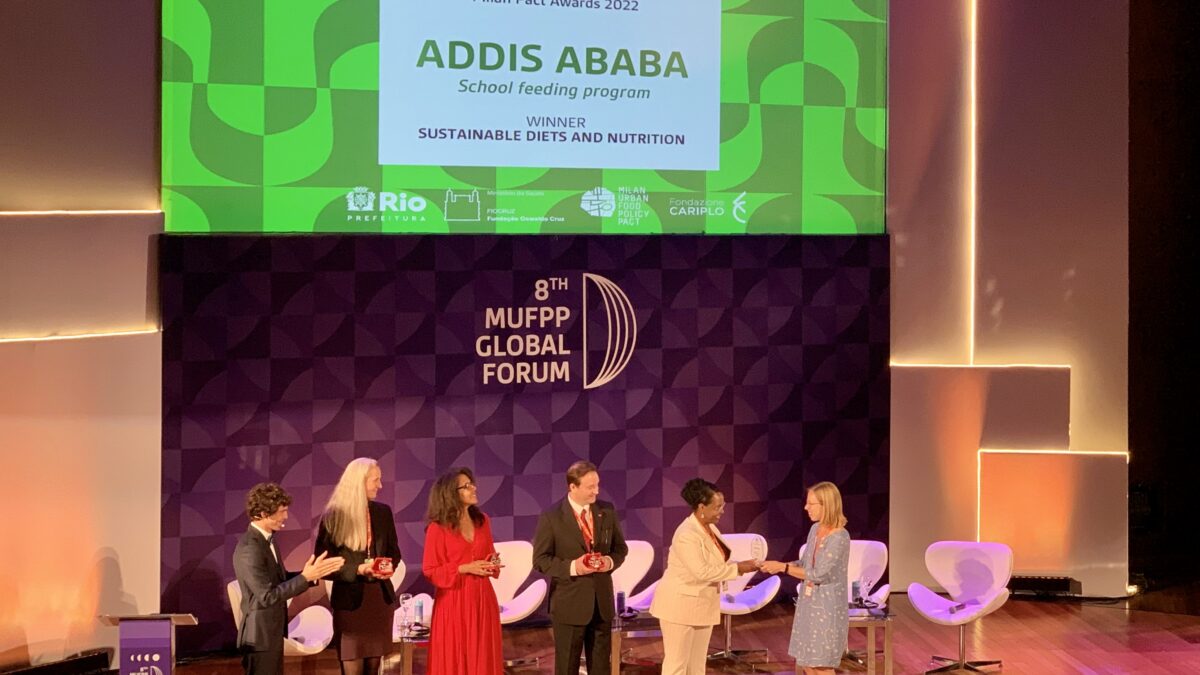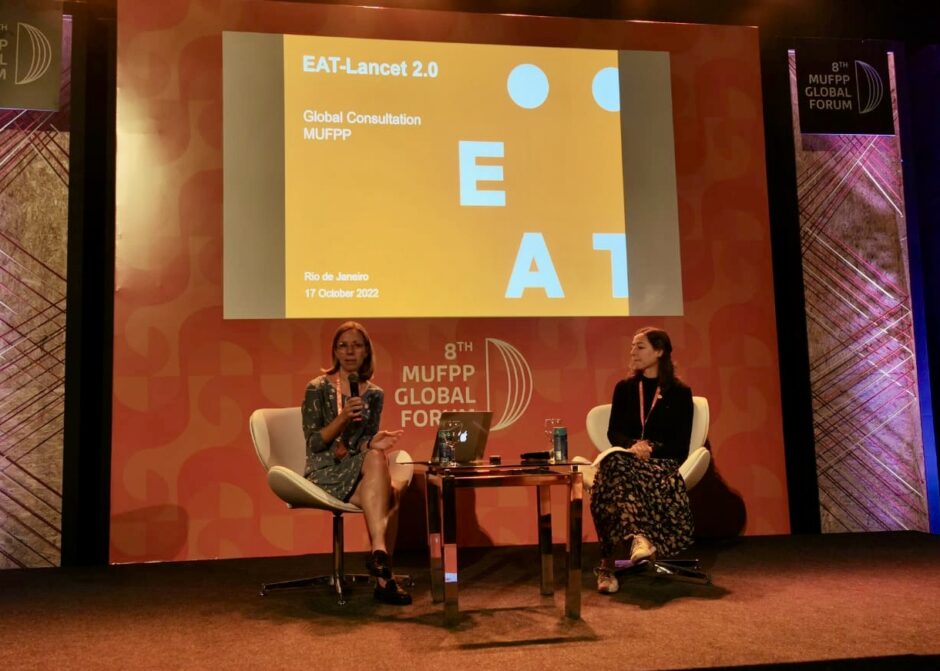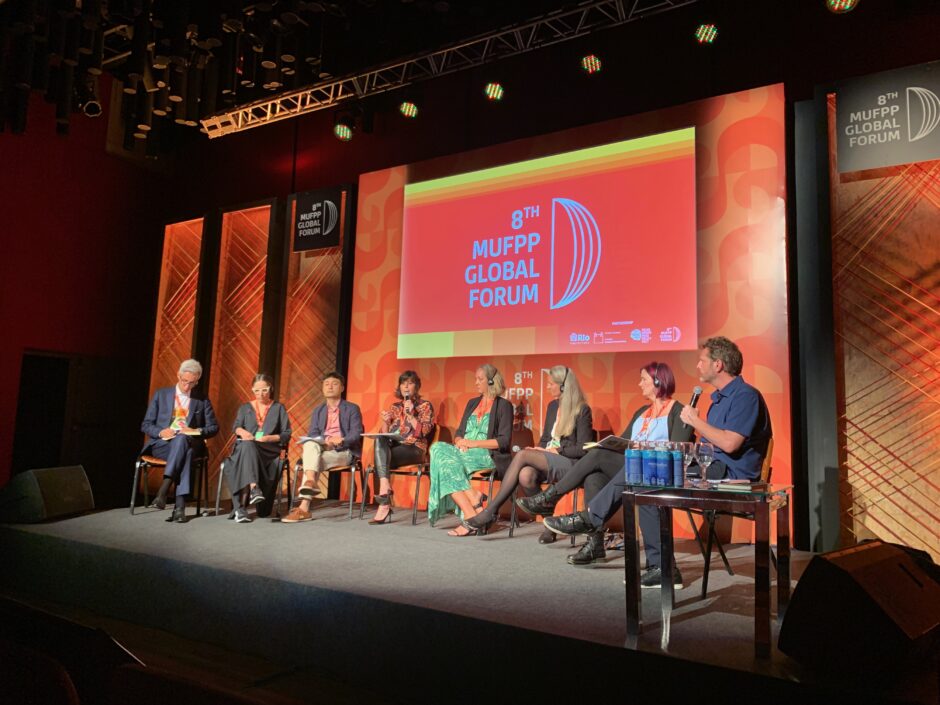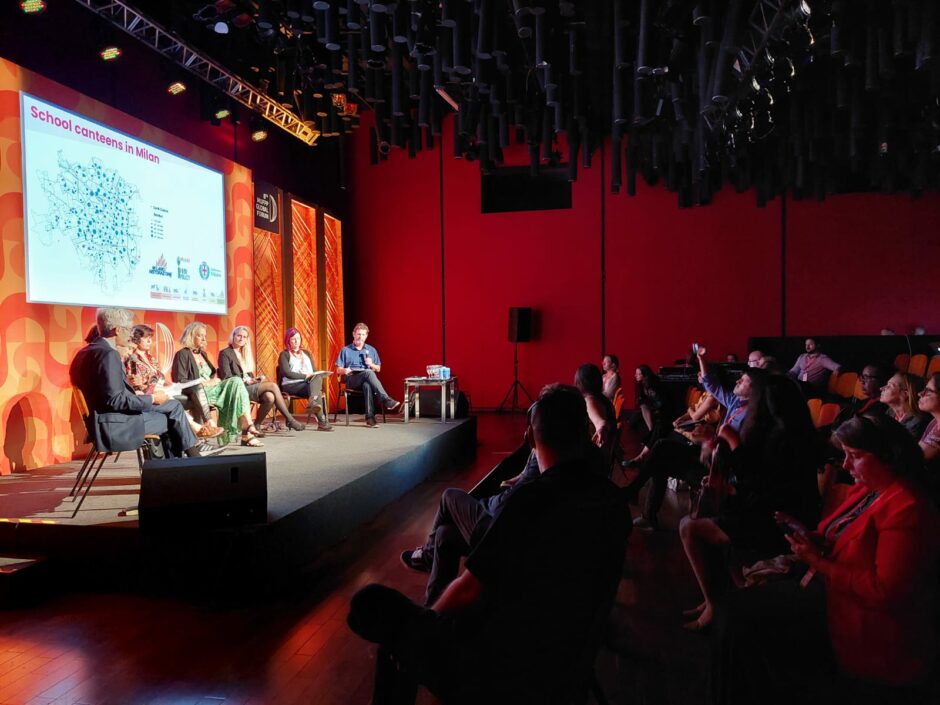
Since 2015, the city of Milan has been a leader in convening cities to support sustainable urban food systems through the Milan Urban Food Policy Pact (MUFPP). Signed by more than 250 cities committed to sustainable food systems, the Pact includes a list of 37 recommended actions for municipalities to implement, accompanied by indicators to monitor progress.
This inspiring group of cities gather annually at the Milan Pact Global Forum, to exchange learnings and best practices and to celebrate success. The Forum also features an annual Milan Pact Awards program, in which cities are recognized for concrete implementations of best-practice initiatives and food policies.
EAT has attended the MUFPP Global Forums since 2016 and is continuously inspired by cities’ ambitious efforts for more sustainable and healthy food systems, serving their current and future residents.
In October 2022, the city of Rio de Janeiro hosted the 8th Global Forum of the Milan Urban Food Policy Pact on the theme of “Food to Feed the Climate Justice: urban food solutions for a fairer world.” Below are highlights from EAT at the 2022 Global Forum.
Milan Pact Awards Ceremony
EAT Founder and Executive Chair, Gunhild Stordalen, was a member of the evaluation committee for the 2022 Milan Pact Awards. On her behalf, Emily Norford, EAT’s Urban Food Systems Manager, presented the three special mentions and award winner for the “Sustainable Diets and Nutrition” category.
The city of Addis Ababa, Ethiopia, was the winner of the “Sustainable Diets and Nutrition” Award, for initiating a large-scale school feeding program for more than 450,000 school children and 225 elementary schools and generating employment for 10,000 women in the city involved in the project. The project contributed to significant educational outcomes like increased enrollment, school performance and attendance.
The cities of Copenhagen, Paris, and Torres Vedras also received special mentions in this category. You can watch the Awards ceremony on YouTube.

EAT-Lancet 2.0 Consultation
Building on the findings of the first publication, EAT-Lancet 2.0 will include new elements such as a greater focus on diversity and the adaptation of regional and local diets, a new focus on food justice and social food system goals, and enhanced diversity of the Commission itself.
As part of a series of Global Consultations to engage stakeholders in sharing their food system priorities, knowledge gaps, and input for consideration by the EAT-Lancet 2.0 initiative, EAT ran an in-person consultation at the Global Forum. If you are interested in the process and would like to take part in a future consultation, please contact [email protected].

Food Trails and EAT Co-hosted Panel
Science has outlined what a healthy and sustainable diet within planetary boundaries is, but how can we help everyone eat this way? One approach is through public procurement: the food that city governments purchase for public meals, like in school canteens, elderly care homes, and other municipal facilities.
EAT and the Food Trails project co-organized a panel at the Global Forum, on ‘Sustainable, healthy and just food procurement for people and planet.’ Food Trails, an EU-funded Horizon 2020 project, works to co-develop pilot activities and urban food policies in 11 European cities. Three participating Food Trails cities – Milan, Copenhagen and Birmingham – took part in the panel.
The panel was moderated by the charismatic David Hertz, founder of Gastomotiva – a Brazilian initiative promoting inclusion through Social Gastronomy.
The diverse panel representing seven global cities embarked on a fruitful discussion on procurement practices, and how their cities are purchasing food in ways that contribute to healthy, sustainable and fair food systems.
Public procurement can be channelled through school meals for equity purposes, while also supporting health and sustainability. Milan shared its perspective of procurement as a tool to support equity in its 600 schools, enabling better student retention through school meals. In Daegu, Korea, public procurement is channelled to provide fruit snacks in 228 primary schools to form healthy eating habits while also supporting local and seasonal agriculture. Similarly, in one of the biggest school feeding programs in the world, Rio de Janeiro uses public procurement to ensure healthy food in schools, while also purchasing 40% of its products from small farmers. The city of Guadalajara uses public procurement to defend the principle that food is a right. It does this through youth centers, urban gardens, and community kitchens by providing “planetary diet” meals for children under six.
Public procurement can also be considered through a political, or even behavioral lens. New York City, a 2022 signatory of the Good Food Cities Declaration, leverages public procurement to establish food and nutrition standards for all NYC meals, for example by including a 10% limit on calories from added sugar. The Big Apple also involves students in menu development, requiring a 75% approval rate for all new dishes. The city of Copenhagen applies procurement as a means of bringing political goals to life. For example, in order to enact the new Danish dietary guidelines and reach the city’s target of 90% organic food in public meals, healthy food are weighted more favourably in the city’s procurement evaluation. Finally, Birmingham uses a behavioral change model (COM-B) to overcome procurement challenges and advance integrated food systems efforts.
All examples shared at the Milan Pact Global Forum illustrated that the public procurement of food can be a flexible tool that contributes to healthy, sustainable and just food systems.

You can watch a recording of the EAT-Food Trails session on YouTube (excuse the technical difficulties!).
![]() The FOOD TRAILS project has been funded by Horizon 2020 Grant Agreement n. 101000812. foodtrails.milanurbanfoodpolicypact.org
The FOOD TRAILS project has been funded by Horizon 2020 Grant Agreement n. 101000812. foodtrails.milanurbanfoodpolicypact.org
Read more on EAT’s work with cities in our Cities framework.